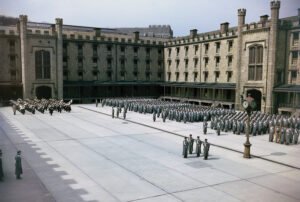LBJ’s American Promise: The 1965 Voting Rights Address
By Garth E. Pauley, Texas A&M University Press, 2007
Lyndon Johnson had many political skills. He was a masterful legislative strategist, a great persuader and a first- rate vote counter. Johnson’s strengths, however, did not generally include his speechmaking ability or the power to inspire people with his words. A notable exception to that was his address to Congress on March 15, 1965—eight days after a confrontation between civil rights marchers and law enforcement officials in Selma, Alabama, that became known as Bloody Sunday. In the address, the president urged passage of the Voting Rights Act. The eloquence of the speech, combined with Johnson’s passion for the subject, helped persuade some wavering lawmakers on both sides of aisle to support the measure.
Though Johnson’s powerful speech has been discussed in many other venues, it has not been the subject of a book-length dissection. Garth E. Pauley, associate professor of communication arts and sciences at Calvin College in Michigan, has filled this analytical vacuum with LBJ’s American Promise: The 1965 Voting Rights Address.
The author’s scholarship is sound and his ability to place the speech in broader historical context helps the reader gain a greater understanding of how civil rights policy has evolved. In fact, the book would have been stronger if Pauley had spent more time on the content and writing of the speech and a little less on the history.
During the historical discussion, there is little mention of Johnson’s fervent opposition to civil rights legislation during the early part of his congressional career. Pauley could have remedied that by summarizing the findings of esteemed Johnson biographers Robert Caro and Robert Dallek.
Also, Pauley’s writing is occasionally ponderous. He describes the speech as a “highly effective rhetorical intervention into a complex exigency.” I suspect that means it was an effective speech that helped diffuse a tense situation.
The author’s overall assessment of the speech is that it transformed the discussion of voting rights from a political debate to a moral one. He credits Johnson with changing the nation’s political culture by “writing African-Americans and the struggle for racial justice into the story of America.”
Pauley points out what he sees as the flaws in the speech. He faults Johnson for being overly concerned with his own historical legacy and for not singling out the South for enough criticism of the strong legacy of racism in the region.
Both of those assessments are problematic. Johnson was no more concerned with how he would be remembered by future generations than most of the nation’s chief executives. Further, if Johnson had been tougher on his native region he might have caused even more political problems for Democrats among Southern whites.
Books devoted to analyzing a single presidential speech are risky propositions. For example, Garry Wills’ Lincoln at Gettysburg and Thurston Clarke’s Ask Not, about President John F. Kennedy’s inaugural address, are the works of engaging storytellers with a taste for gossip and historical intrigue.
LBJ’s American Promise: The 1965 Voting Rights Address does not reach those narrative heights. Nevertheless, readers looking for a balanced and insightful look at one of most significant presidential speeches in history will find this book to be worthwhile.
Originally published in the October 2007 issue of American History. To subscribe, click here.




